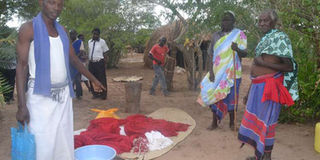Shame of Kilifi’s neglected elderly

The chairman of the Kaya Godhoma Rescue Centre, Emmanuel Katana (left), shows some traditional clothes at the locatioin on June 28, 2016. PHOTO | SAMUEL KAZUNGU | NATION MEDIA GROUP
What you need to know:
- The only crime for nineteen old men and women is that they are suspected of witchcraft on account of their grey hair and red eyes.
- They now live at Kaya Godhoma, a rescue centre at the far-flung Mrima wa Ndege, in Ganze, deep in Kilifi.
They were saved from the threat of mob justice but are now living in abject poverty and pain.
These are the rejected and neglected Kilifi elders, who have been thrown out of their homes by their families to languish in the wilderness.
The only crime for nineteen old men and women is that they are suspected of witchcraft on account of their grey hair and red eyes.
They now live at Kaya Godhoma, a rescue centre at the far-flung Mrima wa Ndege, in Ganze, deep in Kilifi.
To save them from lynch mobs, the community figured out that their “enemies’’—actually the elders’ close relatives and neighbours—would not have the audacity to attack them at a holy shrine.
But they might as well have jumped from the frying pan into the fire: The community that is supposed to clothe and feed them is itself a picture of abject poverty.
When Nation reporters visited the shrine on Wednesday, they were met by a group of frail and sickly old men and women on the verge of starvation.
The octogenarians were all thrown out of their homes by family members, mainly their own children and grandchildren, over allegations of witchcraft.
In interviews with a number of them, shrine officials and community leaders, it emerges that accusations of witchcraft were possibly excuses to take over their property.
It was a conversation with people in deep pain and a longing to be re-united with the same families that have rejected them. In breaking voices and glowing eyes, some recalled the good times with their children, before breaking down in tears.
Community leaders, however, say they cannot be released to their families until their security is assured. Further, their families have shown little interest in getting them back and do not visit.
“We have to follow a lengthy procedure before releasing them to return home,’’ says Kaya chairman Emmanuel Katana.
“Most of their families, their children included, show little interest in them,” Mzee Katana adds.
According Mzee Katana the rejected and dejected elders were adjudged to be witches and wizards by witchdoctors.
Although we are told that Ms Jumwa Kalume from Palakumi, is 80 years old, she looks more than 90. Frail and sickly, she complained of chest and stomach pains, a consistent cough punctuating our interview.
When her daughter-in-law was taken ill with what Mr Katana and other elders say appeared to be arthritis last year, her grandchildren concluded that she had bewitched their mother. One evening, she said, they poured petrol on her hut and set it alight.
Luckily and unknown to the arsonists, she was not in the house. Ms Kalume was rescued and taken to the shelter.
She now believes that the real reason behind her being thrown out was her land, cows and goats.
“I have forgiven them and I love them a lot. I miss my grandchildren and would like to return home,’’ she says, amid sobs.
However but Mr Katana says it would be risky to send her back home. “We have spoken to the son many times and when we ask if he wants the mother back, he says they need time to think about it,’’ says the Kaya chairman.
Pola Kilao Charo was born in 1930. When one of her grandsons was admitted to hospital, his parents decided to take him home instead and he died. Upon inquiring about his health, she was branded a witch, she says.
Minutes later, an urgent family meeting was convened where it was decided she had to leave the home, she recalls. Her last- born son escorted her out of her home. Ms Charo sought refuge for three days at the nearby Bamba Police Station. On the third day, she says, relatives told her that they had come to take her back home only to dump her at the shrine.
Joseph Katana’s case is possibly the saddest. The dirty and dishevelled man with failing eyesight is lucky to be alive.
A former cook for a whiteman at Watamu, the 70-year-old narrates how he was stoned by one of his wives and her sons until he almost lost his sight.
The family accused him of selling a beach plot without their knowledge. He broke down and cried, explaining how the family started associating him with witchcraft. It was then that he knew where he would end up. Mzee Katana, says he quickly approached his pastor to hide the land ownership documents on his behalf. The pastor would rescue him and take him to the shelter. Now he does not know the fate of his property and has yet to get a clear answer from the pastor. He wants to sell his property to educate his six daughters and build a house each for the sons who attacked him.
The Nation learnt of 17 similar cases.
At the Kaya, we found Kilifi county government social worker Fred Konde speaking to the elders while overseeing the rehabilitation of their makuti-thatched hovels.
Later, officials from the county government’s central stores visited to check the facilities that the county had donated, including a water tank and makuti.





